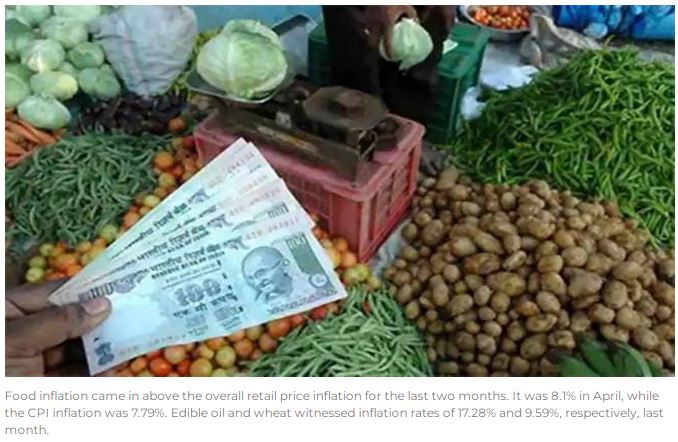Indonesia – Economists see May and June numbers above headline rate: Food inflation easing, but to stay above comfort level
Indonesia lifting a three-week-old ban on palm oil exports and the government’s decision to curb wheat exports will help ease food inflation and thereby the overall consumer price index (CPI) inflation in the coming months, according to economists. However, food inflation may still remain above the headline rate in the short term.
Food inflation came in above the overall retail price inflation for the last two months. It was 8.1% in April, while the CPI inflation was 7.79%. Edible oil and wheat witnessed inflation rates of 17.28% and 9.59%, respectively, last month.
“We expect CPI to be around 7% in coming months while food inflation will be between 7.5% and 8% in this period,” Madan Sabnavis, chief economist at Bank of Baroda, said.
According to Indranil Pan, chief economist at YES Bank, food inflation may not come below the headline retail inflation in May itself, even with the ban on wheat exports and easing of imports of palm oil. This, he said, is because the pressure on prices is coming from almost all categories of food items, be it cereals or even fruits and vegetables, and also protein-rich items such as meat, eggs, fish, etc. “The other perspective is that the sequential momentum may ease to an extent, but due to the adverse base effect from the last year, the year-on-year food inflation levels will remain elevated.”
Edible oil prices have increased by 20-30% in the last one year, taking cue from elevated prices in the global markets and shortfall in domestic production. The government had stated that global prices of edible oils are under pressure due to a shortfall in global production and increase in export tax and levies by the exporting countries.
Earlier this month, RBI governor Shaktikanta Das had stated that edible oil prices may go further up despite the central bank hiking the repo rate by 40 bps to 4.4%. He had said it was due to export restrictions by key producing countries and the loss of sunflower oil output amid the Russia-Ukraine war. “Looking ahead, food inflation pressures are likely to continue,” he stated.
India imports about 55% of its annual edible oil consumption. Trade sources said that edible oil prices in the domestic markets would moderate in coming days as exports from Indonesia would commence from Monday.
Stating that the wheat export ban amid Indonesia’s relaxation on crude palm oil exports should prevent a further hardening of the food inflation trajectory going ahead, Aditi Nayar, chief economist at Icra, said, “We foresee a dip in the food inflation in May, which should dampen the headline food inflation as well to sub 7%.”
The government had last week banned export of all varieties of wheat in view of the rising domestic prices of the cereal, a sharp drop in rabi season output and the possibility of its stocks becoming inadequate to ensure subsidised supplies under the National Food Security Act.
Official sources said about 4.5 million tonne of the wheat had already been contracted for shipments out of which around 2 MT has been exported. However, since the decision to ban, mandi prices of wheat across Madhya Pradesh, Rajasthan, Uttar Pradesh, Punjab and Haryana have declined 7-8% since the ban was imposed a week ago.
Wheat prices are expected to rule around the minimum support price of Rs 2,015 a quintal in the coming months, traders say. “There will be an improvement in domestic supplies of palm oil in the coming months and it will curb the spike in prices of edible oil,” Ashok Gulati, chair professor, Indian Council for Research on International Economic Relations (ICRIER), told FE.
However, Gulati said India should follow Indonesia’s step and lift the export ban on wheat so that the global supplies could improve. The government’s wheat production estimate was revised to 106 million tonne (MT) for the 2021-22 crop year (July-June) on Thursday from 111 MT estimated in February.
Annual imports of edible oil is around 13 MT, which consists of mostly palm oil (8 MT), soyabean and sunflower. Palm oil imports are from Malaysia and Indonesia.
Pan said: “The decision to ban wheat exports was on the back of widespread loss of yield due to abnormal heat waves in the major wheat-growing states of the country. As per the current stocking norms, the buffer stocks should be around 27.5 MT as on July 1 each year. As of May, the FCI has a stock of 30.3 MT. Thus, the margin of error is slim and hence the ban on wheat was more with regards to maintaining domestic food security rather than with an intention to contain inflation.”
Source: https://www.financialexpress.com/economy/economists-see-may-and-june-numbers-above-headline-rate-food-inflation-easing-but-to-stay-above-comfort-level/2532767/


 English
English




